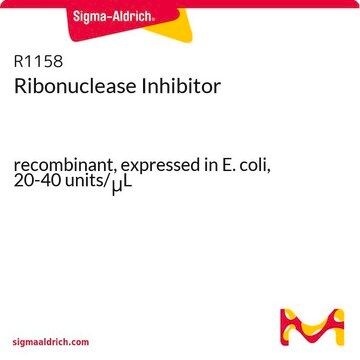R0884
T7 RNA Polymerase
recombinant, expressed in E. coli, buffered aqueous solution
Sinónimos:
RNA Polymerase T7, RNA Polymerase, T7 from E. coli HMS 174/pAR1219
Iniciar sesiónpara Ver la Fijación de precios por contrato y de la organización
About This Item
Número de CAS:
MDL number:
UNSPSC Code:
12352204
Productos recomendados
recombinant
expressed in E. coli
grade
for molecular biology
form
buffered aqueous solution
mol wt
98.8 kDa
concentration
10,000-50,000 U/mL
UniProt accession no.
foreign activity
DNase and RNase, none detected
storage temp.
−20°C
Gene Information
bacteriophage T7 ... T7p07(1261050)
¿Está buscando productos similares? Visita Guía de comparación de productos
General description
T7 RNA polymerase is highly specific for the bacteriophage T7 promoter and terminator sequences. It is extensively used to prepare RNA transcripts for stuctural and metabolic studies. The RNA transcripts can be converted to probes for sensitive hybridization detection studies. T7 polymerase and dideoxynucleotides can be used to directly sequence DNA.
Components
T7 RNA Polymerase is supplied as a solution of 100 mM NaCl, 50 mM Tris-HCl (pH 7.9), 0.1 mM EDTA, 0.1% Triton X-100, 1 mM DTT, and 50% (v/v) glycerol.
Unit Definition
One unit will catalyze the incorporation of 1 nmol of rNTP into acid-precipitable material in 60 min at 37°C.
Analysis Note
Activity assay: 40 mM Tris-HCl, pH 7.9, 6 mM MgCl2, 4 mM spermidine, 10 mM DTT, 0.5 μM each rNTP + 10 μCi α-32P-UTP, 3-10 units of enzyme, and 1 μg of a 350 bp template are incubated for 10 min at 37°C in a total volume of 100 μl. Typical results are ≥50% incorporation of labeled nucleotide into ≥90% full-length transcript.
related product
Referencia del producto
Descripción
Precios
Glutathione S-Transferase from E. coli, recombinant, expressed in E. coli, buffered aqueous solution
Ribonucleasa A from bovine pancreas, for molecular biology, ≥70 Kunitz units/mg protein, lyophilized
Storage Class
10 - Combustible liquids
wgk_germany
WGK 3
flash_point_f
Not applicable
flash_point_c
Not applicable
Elija entre una de las versiones más recientes:
¿Ya tiene este producto?
Encuentre la documentación para los productos que ha comprado recientemente en la Biblioteca de documentos.
Los clientes también vieron
V D Axelrod et al.
Biochemistry, 24(21), 5716-5723 (1985-10-08)
RNA synthesis by T7 RNA polymerase or SP6 RNA polymerase is 100-1000 times more sensitive to the presence of the 3'-deoxyribonucleoside 5'-triphosphate chain terminators than is RNA synthesis by Escherichia coli RNA polymerase or Q beta replicase. These ribonucleotide analogues
Characterization of T7-specific ribonucleic acid polymerase. 1. General properties of the enzymatic reaction and the template specificity of the enzyme.
M Chamberlin et al.
The Journal of biological chemistry, 248(6), 2235-2244 (1973-03-25)
David L Shis et al.
Proceedings of the National Academy of Sciences of the United States of America, 110(13), 5028-5033 (2013-03-13)
The construction of synthetic gene circuits relies on our ability to engineer regulatory architectures that are orthogonal to the host's native regulatory pathways. However, as synthetic gene circuits become larger and more complicated, we are limited by the small number
Guillaume Allorent et al.
Plant molecular biology, 82(1-2), 59-70 (2013-03-16)
Arabidopsis seed formation is coupled with two plastid differentiation processes. Chloroplast formation starts during embryogenesis and ends with the maturation phase. It is followed by chloroplast dedifferentiation/degeneration that starts at the end of the maturation phase and leads to the
Danil Pupov et al.
The Biochemical journal, 452(2), 241-248 (2013-03-23)
Besides canonical double-strand DNA promoters, multisubunit RNAPs (RNA polymerases) recognize a number of specific single-strand DNA and RNA templates, resulting in synthesis of various types of RNA transcripts. The general recognition principles and the mechanisms of transcription initiation on these
Nuestro equipo de científicos tiene experiencia en todas las áreas de investigación: Ciencias de la vida, Ciencia de los materiales, Síntesis química, Cromatografía, Analítica y muchas otras.
Póngase en contacto con el Servicio técnico








